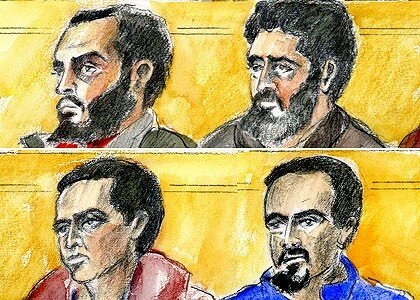
Four men who appeared in court following yesterday's raids: (top) Saney Aweys, Nayef El Sayed. (bottom) Yacqub Khayre, Abdirahman Ahmed.
The arrest of a number of Australian citizens on charges related to terrorism with alleged links to Somalia and Lebanon has drawn attention to the ethnic communities that they were part of in Melbourne. It is also seen the issue of migration raised again.
Presenter:Michael Cavanagh
Speaker: Kelvin Thompson, federal Labor Party MP; Peter van Vliet Director, of the Federation of Ethnic Communities Councils of Australia.
CAVANAGH: Up until the arrest of the men — Australia’s Somalian community has been largely able to get on with life with little attention being paid to them — although there have been isolated violent incidents involving some of their young men — with subsequent claims that they find it difficult to settle in Australia.
However with the charging of the men — with claims that they planned an attack on a military base in western Sydney — authorities have been jolted by the fact that they are Australian citizens — and not a group who had entered the country specifically to carry out an attack.
Labor Government backbencher Kelvin Thompson who while in opposition was touted as a possible minister until he provided a reference for a convicted drug trafficker — and who’s own electorate has a large number of migrants says there needs to be greater scrutiny of people hoping to make Australia home.
In a speech to secondary school students he specifically referred to the behaviour of one of the men charged when appearing in court…
THOMSPON : “There needs to be more vetting of both prospective migrants, and temporary residents, including students, to minimise the risk that people who do not respect Australia’s laws and legal system will enter this country – and someone who refuses to stand up when asked by a judge, and says ‘I stand only before God’, does not respect Australia’s laws or legal system.”
CAVANAGH:The charged man had told the court that he was not a terrorist — instead accusing Australia’s military of killing innocent people in Afghanistan and Iraq.
Australia’s major political parties historically have taken a largely bi-partisan approach to migration.
Although during the time of the John Howard-led conservative coalition the community was largely split when the former Prime Minister introduced measures making it more difficult for refugees to gain residency.
It was used by him during the 2001 election campaign…
HOWARD: “We will decide who comes to this country and the circumstances in which they come.”
CAVANAGH:Since the Coalition’s demise and Labor coming to power — there has been an easing in how people seeking refuge are treated — the opposition argues this has made it easier for people planning to wreak havoc to slip through the net…
A point disputed by Peter van Vliet Director of the Federation of Ethnic Communities Councils of Australia better known as FECCA…
VAN VLIET: “If you look at the number of terrorists in the courts most of them tend to have been born here and some of them are actually from Anglo-Saxon backgrounds. Its actually often not the migrants themselves that are causing the problems. Certainly we want people to be good Australian citizens and we support the law dealing with any terrorist or alleged terrorist but the correlation between that and the immigration program is a bit tenuous because DEAC has very stringent security health checks on Australian migrants and those checks are done regardless of the level of the migration programmed.”
CAVANAGH: Kelvin Thompson argues that migration levels should be reduced to enable authorities to carry out proper checks.
THOMPSON: “Now it will be objected that this amounts to accusing migrants generally of being prospective terrorists, but this is no more true than the claim that the existence of a police force is an accusation that all of us are prospective criminals, or that having examiners walking down exam aisles means that all students are prospective cheats. The overwhelming majority of us are not prospective criminals, the overwhelming majority of students are not prospective cheats, and the overwhelming majority of migrants are not prospective terrorists. But we are all entitled to be protected from the few who are, and slowing down the migrant intake need not be at the expense of humanitarian and refugee applicants.”
CAVANAGH: FECCA’S Peter van Vliet says given the present atmosphere following the arrest of the alleged terrorists there needs to be responsible debate…
VAN VLIET :”Given the events of the past week it’s a good time not to be provocative about these matters and to have a sensible and calm public debate about these issues.”
- Listen:
- Windows Media
Source: radioaustralia.net






